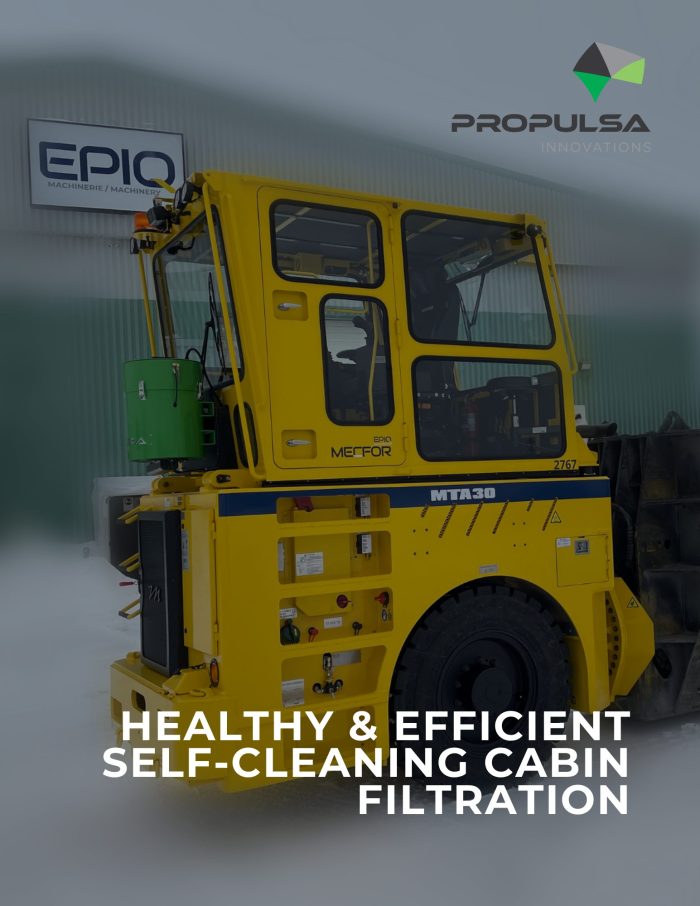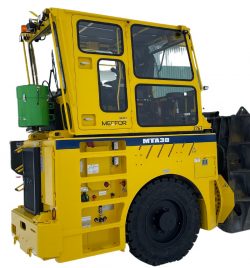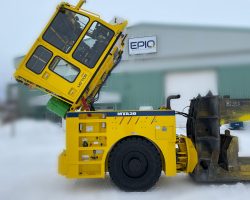Healthy and efficient self-cleaning cabin filtration for specialized equipment in the aluminium industry

Written in collaboration with:
Carl Lapointe, Product Engineer, EPIQ MECFOR
Denis Dumais, Vice President of Innovation, Propulsa
Eric Tremblay, Mobile Vehicle Investment Plan Manager P-155, Rio Tinto
“Working together” is the mantra that resonates within our own teams as well as the greater Quebec aluminium industry. Indeed, the market potential tied with our ambition to win value-added collaborations is a model of choice for small and medium-sized companies alike. Propulsa, an innovative filtration system company in the Saguenay, benefits from such a collaboration with EPIQ MECFOR—a manufacturer known for its specialized heavy equipment—and with Rio Tinto—notably through the support of Regional Economic Development (RED) and operations teams.
The collaboration of these three players has allowed the installation of the very first EPURA self-cleaning filtration system with an independent carbon cartridge on a EPIQ MECFOR anode hauler. This innovation is currently being tested at Rio Tinto’s Grande-Baie plant over the next few months.
A winning synergy
In the process, one of the best possible uses for testing the performance of the EPURA filter was undoubtedly with a piece of heavy industrial equipment such as an anode hauler. Anode haulers operate in an industrial environment where airborne carbon dust is omnipresent. Moreover, since the anode hauler circulates in the pot rooms with aluminium dust, cabin filtration has to be efficient in order to ensure the health and safety of the workers at all times. This is why this type of vehicle is often subject to frequent filter and carbon replacement—to maintain good air filtration. There were no better conditions to challenge the performance of EPURA’s self-cleaning technology with the addition of a rechargeable carbon cartridge.
After receiving a presentation on the product, the EPIQ Machinery team was delighted with the product and agreed to participate in advancing this new technology. “Within a limited area, we are located near EPIQ Machinery, a leading North American manufacturer of this type of equipment, and Rio Tinto, a primary aluminium producer well established in the region. Fortunately, all our partners have shown an uncommon openness to collaborate on this project,” says Denis Dumais, Vice President of Innovations at Propulsa and the visionary behind this invention.
Innovation means adapting the design
Thanks to the close collaboration between EPIQ Machinery and Propulsa, the main integration challenges related to space and electrical input were met. First, we had to analyze the available space to limit the changes to the design of the EPIQ MECFOR hauler. There was an issue with the size of the new system. On the anode hauler, there was only one possible place where the system could be installed without affecting the operator’s field of vision. It was necessary to design a suitable support and redesign the box to install it in according to the orientation.
 “Visibility for the operator is uncompromising. This is an unmatched feature of EPIQ MECFOR’s design for this type of equipment. Also, the normal functions of the vehicle and the cab’s tipping feature, which eases maintenance and upkeep, were not to be altered in any way,” says Carl Lapointe, Product Engineer at EPIQ MECFOR. In a second step, the Propulsa team had to re-evaluate the available power supply for its system. In fact, the EPURA system is normally powered with 24 volts. However, for the installation on the anode hauler, it was necessary to select a high-performance fan powered with 12 volts. Finally, the EPURA system has its own man-machine interface that allows to follow the evolution of the filter’s condition live and ensure optimal filtration at all times. This provides a practical aspect when the system replaces a filtration system on an existing vehicle.
“Visibility for the operator is uncompromising. This is an unmatched feature of EPIQ MECFOR’s design for this type of equipment. Also, the normal functions of the vehicle and the cab’s tipping feature, which eases maintenance and upkeep, were not to be altered in any way,” says Carl Lapointe, Product Engineer at EPIQ MECFOR. In a second step, the Propulsa team had to re-evaluate the available power supply for its system. In fact, the EPURA system is normally powered with 24 volts. However, for the installation on the anode hauler, it was necessary to select a high-performance fan powered with 12 volts. Finally, the EPURA system has its own man-machine interface that allows to follow the evolution of the filter’s condition live and ensure optimal filtration at all times. This provides a practical aspect when the system replaces a filtration system on an existing vehicle.
Greener and more efficient air filtration
EPURA’s patented technology is in its early stages of commercialization. It’s already available in two versions: EPURA cabin and EPURA engine. The one being tested at Rio Tinto’s Grande-Baie plant is the EPURA cabin system with a carbon cartridge. This system allows for continuous and constant pressurization of an operating cabin thanks to a high-performance fan—regardless of the level of filter clogging. It’s also equipped with an independent and refillable carbon cartridge for capture of gases.
In fact, the carbon filter is the new element in the EPURA product line. This first project with EPIQ Machinery and Rio Tinto is therefore essential. The goals and expectations of this prototype installation are high:
- demonstrate competitive economic advantages;
- ensure performance from a health and safety perspective; and
- impact the environment as little as possible.
For these reasons, a very close follow-up on the product performance is planned. Once a week, a Propulsa technician will inspect and collect data on the general condition of the system. While the customer will perform in-cabin gas tests to ensure that HF and SO2 exposure limits are met at all times. Although extremely confident, it’s only at the end of the three-month prototype study that confirmation of EPURA’s performance and efficiency will be possible.
Simplified maintenance with optimal performance for workers’ health
One of the goals of the EPURA filtration system is to simplify maintenance and eliminate filter changes. Using pressure sensors, the system detects when the filter has a high degree of clogging and performs a self-cleaning. The operator is assured of quality air. Fail-safe mechanisms always monitor the system. A first reading from the sensor determines if the self-cleaning process should be initiated. In the event of a failure, there is another indicator that allows action to be taken without risking the health and safety of the operators.
Unlike the competition, the self-cleaning filter is independent of the carbon cartridge. This design allows only the carbon to be replaced. Therefore, since there’s no longer a contaminated filter to change and dispose of, the annual reduction of contaminated waste year for a fleet of industrial equipment is considerable. The only waste will be the carbon cartridge—not the entire filter.
We believe that for end users, there are significant gains in terms of operations (equipment availability), maintenance, worker health and safety, and the environment. For all these reasons, we’re confident that the return on investment for the customer will be quick.
Patented in more than 32 countries, Propulsa’s unique air filtration technology provides particularly significant improvements for industrial vehicle owners. EPIQ Machinery is pleased to contribute to the growth of this innovative filtration technology. We’ve recognized the added value of the product for harsh, high-density dust environments, and we’ve convinced our customers.
We’re proud to be part of innovations that improve our client’s daily lives. In the end, everyone wins. Propulsa will continue to perfect its technology, EPIQ Machinery will offer state-of-the-art equipment, and Rio Tinto will obtain a high level of air quality in its equipment cabins in a consistent, worry-free manner. It’s one of Quebec’s great success stories that’s contributing to the advancement of our aluminium industry through innovation, open-mindedness, and collaboration between suppliers, equipment manufacturers, and primary producers!
Media contacts
Rio Tinto
Malika Cherry
Media Relations Advisor – Canada/U.S.
EPIQ Machinery
Isabelle Gaudreau
Marketing and Communications Coordinator
Propulsa
Pascal Tremblay
General Manager